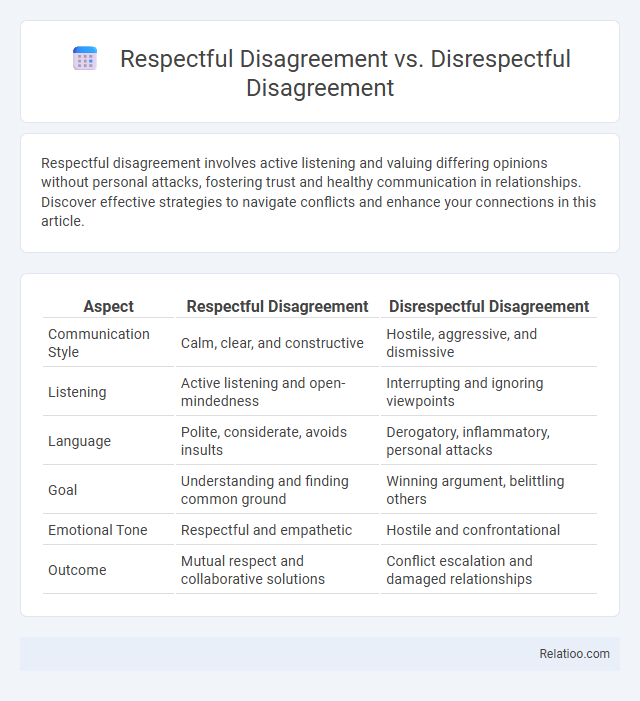Respectful disagreement involves active listening and valuing differing opinions without personal attacks, fostering trust and healthy communication in relationships. Discover effective strategies to navigate conflicts and enhance your connections in this article.
Table of Comparison
| Aspect | Respectful Disagreement | Disrespectful Disagreement |
|---|---|---|
| Communication Style | Calm, clear, and constructive | Hostile, aggressive, and dismissive |
| Listening | Active listening and open-mindedness | Interrupting and ignoring viewpoints |
| Language | Polite, considerate, avoids insults | Derogatory, inflammatory, personal attacks |
| Goal | Understanding and finding common ground | Winning argument, belittling others |
| Emotional Tone | Respectful and empathetic | Hostile and confrontational |
| Outcome | Mutual respect and collaborative solutions | Conflict escalation and damaged relationships |
Understanding the Essence of Disagreement
Respectful disagreement involves acknowledging differing viewpoints while maintaining civility and open-mindedness, fostering constructive dialogue and mutual understanding. Disrespectful disagreement often includes personal attacks, dismissiveness, or hostility, which hampers effective communication and damages relationships. Understanding the essence of disagreement lies in recognizing it as a natural and valuable component of human interaction that can lead to growth and deeper respect when managed thoughtfully.
Defining Respectful Disagreement
Respectful disagreement involves expressing differing opinions without belittling or dismissing others, emphasizing active listening and empathy to maintain constructive dialogue. It contrasts with disrespectful disagreement, which includes insults, interrupting, or undermining others' perspectives, often escalating conflict. Respect in communication fosters mutual understanding by valuing diverse viewpoints and encouraging open, honest exchanges without hostility.
Characteristics of Disrespectful Disagreement
Disrespectful disagreement is characterized by personal attacks, dismissive language, and a refusal to acknowledge opposing viewpoints, often escalating conflicts instead of fostering constructive dialogue. It undermines mutual understanding by prioritizing winning the argument over finding common ground or maintaining civility. In contrast to respectful disagreement, which values diverse perspectives and encourages open communication, disrespectful disagreement erodes trust and damages relationships.
The Importance of Tone and Language
Using respectful tone and language during disagreement fosters constructive dialogue and mutual understanding, preserving relationships even amid conflict. Disrespectful disagreement, characterized by aggressive or dismissive language, escalates tension and undermines effective communication. Prioritizing respectful communication reinforces empathy, encourages open-mindedness, and supports a positive social environment.
Active Listening in Disagreements
Active listening in disagreements fosters respectful disagreement by allowing you to fully understand the other person's perspective without interrupting or dismissing their feelings. This approach contrasts with disrespectful disagreement, which often involves talking over others, ignoring their points, or responding with hostility rather than empathy. Prioritizing respect through active listening not only diffuses tension but also promotes constructive dialogue and mutual understanding.
Constructive Feedback vs. Personal Attacks
Respectful disagreement involves providing constructive feedback that focuses on ideas and behaviors without attacking individuals, fostering open communication and problem-solving. Disrespectful disagreement crosses into personal attacks, targeting character or motives, which undermines trust and dialogue. Maintaining respect in discussions ensures that feedback is framed objectively, promoting growth and mutual understanding.
The Role of Empathy in Conversations
Empathy plays a crucial role in respectful disagreement by allowing individuals to understand and acknowledge differing perspectives without hostility, fostering constructive dialogue. Disrespectful disagreement often stems from a lack of empathy, where dismissiveness or contempt overshadow genuine engagement. Cultivating empathy enhances respect in conversations, enabling participants to navigate conflicts with sensitivity and openness.
Navigating Emotional Triggers in Disagreements
Navigating emotional triggers in disagreements involves distinguishing respectful disagreement, characterized by active listening and empathy, from disrespectful disagreement, which often includes personal attacks and dismissiveness. Maintaining respect requires awareness of emotional responses and employing strategies such as pausing before responding and validating the other party's perspective. This approach fosters constructive dialogue and minimizes escalation, promoting mutual understanding even amid conflicting views.
Impact on Relationships and Collaboration
Respectful disagreement fosters open communication and trust, strengthening relationships and enhancing collaboration by valuing diverse perspectives. Disrespectful disagreement damages emotional safety, leading to conflict, reduced cooperation, and weakened team dynamics. Cultivating respect ensures constructive dialogue, promotes mutual understanding, and supports productive partnerships in both personal and professional environments.
Strategies for Encouraging Respectful Disagreement
Encouraging respectful disagreement involves fostering open communication by actively listening and validating different perspectives without judgment. Establishing clear guidelines that promote empathy, such as using "I" statements and avoiding personal attacks, helps create a safe environment for constructive dialogue. Training participants in conflict resolution skills and emphasizing shared goals further supports maintaining respect even amid differing opinions.

Infographic: Respectful Disagreement vs Disrespectful Disagreement
 relatioo.com
relatioo.com